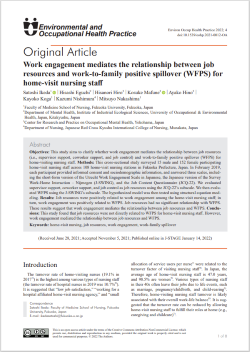#E0045 Work engagement mediates the relationship between job resources and work-to-family positive spillover (WFPS) for home-visit nursing staff

Supervisor Support Can Improve Work-life Balance and Prevent Turnover Among Home-Visiting Nurses
Work engagement is a positive subjective experience associated with commitment to work. It is usually reflected in terms of employee outcomes such as turnover rate, job satisfaction, productivity, burnout, and mental health. Among nursing staff, home-visiting nurses have the highest turnover rates, which is primarily driven by low job satisfaction. Home-visiting nurses, who are mostly in their 40s, often quit their jobs on the grounds of marriage and motherhood. Moreover, this turnover is directly related to "work-family spillover," which occurs when a person's role in the family is influenced by their job or vice versa, and could be either positive or negative. Work-to-family positive spillover (WFPS) has been found to be positively related to job resources in hospital nurses, but have not been evaluated for home-visiting nurses.
A team of researchers from Japan conducted a cross-sectional survey to examine the effects of job resources on job engagement and WFPS in home-visiting nursing staff. The survey included 15 male and 152 female participants from 108 home-visit nursing stations in Fukuoka Prefecture, Japan. Their answers were scored and analyzed. For most of the professions, job resources were found to facilitate work-life balance by improving work engagement and WFPS. These job resources included supervisor support, co-worker support, and job control. While job resources did not directly affect WFPS, they did play a significant role in improving both work engagement and WFPS. Supervisor support was a key factor that improved work-life balance and reduced turnover rates among home-visiting nurses.
Work engagement, which denotes a healthy mental attitude toward work, acts as a bridge between job resources and WFPS. Increased work engagement can result in higher WFPS, which in turn is driven by positive job satisfaction. It is imperative that job resources be supplemented with components like respect and politeness at the workplace, as well as job customization or job crafting opportunities. The findings of this study will be extremely useful in controlling high turnover rates and ensuring better employee satisfaction for home-visiting nurses and other similar roles that require an active balance between work and family.
In conclusion, work-life balance in home-visiting nurses is largely determined by their ability to fulfill their child-care duties and their positive work engagement, and can be positively influenced by support from their seniors or supervisors.

Link to original journal article:
https://www.jstage.jst.go.jp/article/eohp/4/1/4_2021-0012-OA/_article
Title of the paper:
Work engagement mediates the relationship between job resources and work-to-family positive spillover (WFPS) for home-visit nursing staff
Authors:
Satoshi Ikeda, Hisashi Eguchi, Hisanori Hiro, Kosuke Mafune, Ayako Hino, Kayoko Koga, Kazumi Nishimura, Mitsuyo Nakashima
DOI:
10.1539/eohp.2021-0012-OA




